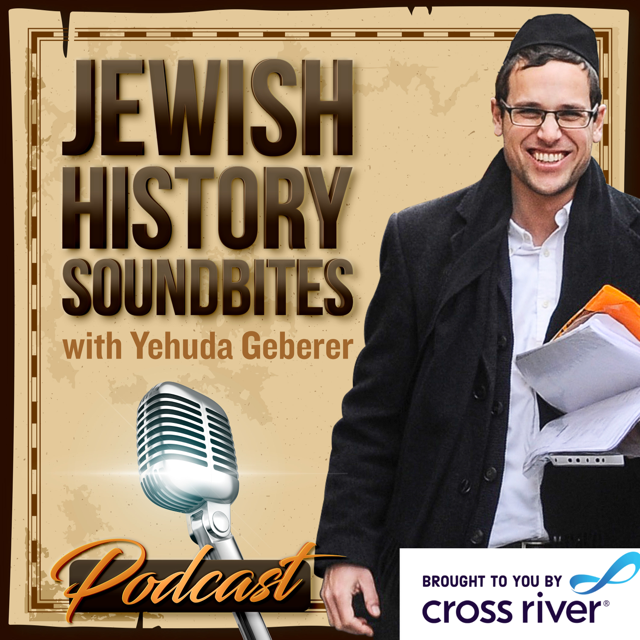
1.7M
Downloads
457
Episodes
Listen to noted Tour Guide, Lecturer and Yad Vashem Researcher of Jewish History Yehuda Geberer bring the world of pre-war Eastern Europe alive. Join in to meet the great personages, institutions and episodes of a riveting past. For speaking engagements or tours in Israel or Eastern Europe Yehuda@YehudaGeberer.com
Episodes
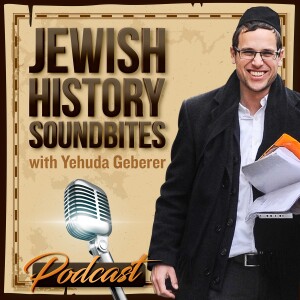
Saturday Dec 21, 2024
After the Eichmann Trial
Saturday Dec 21, 2024
Saturday Dec 21, 2024
The Jewish People, Israeli society and the world at large confronted the Holocaust in the years following the Eichmann trial. Survivors began submitting testimony and writing their memoirs, historians and scholars embarked on research projects in a more systematic fashion and the Holocaust became a permanent element of the international consciousness. Hannah Arendt’s book, Eichmann in Jerusalem, generated much controversy and response. Her exploration of the ‘banality of evil’, as well as her controversial statements regarding the trial itself and Jewish leadership during the Holocaust, resulted in a slew of books, articles and general polemics to disprove many of her ideas and statements. Eichmann’s defense of ‘just following orders’, generated responses as well. From Stanley Milgram’s famous authority experiments at Yale, to Phillip Zimbardo’s Stanford prison experiment, social psychologists seemed as keen as understanding the Holocaust as much as historians.
Cross River, a leading financial institution committed to supporting its communities, is proud to sponsor Jewish History Soundbites. As a trusted partner for individuals and businesses, Cross River understands the importance of preserving and celebrating our heritage. By sponsoring this podcast, they demonstrate their unwavering dedication to enriching the lives of the communities in which they serve. Visit Cross River at https://www.crossriver.com/
Subscribe to Jewish History Soundbites Podcast on: PodBean: https://jsoundbites.podbean.com/ or your favorite podcast platform
Follow us on LinkedIn, Twitter or Instagram at @Jsoundbites
For sponsorship opportunities about your favorite topics of Jewish history or feedback contact Yehuda at: yehuda@yehudageberer.com
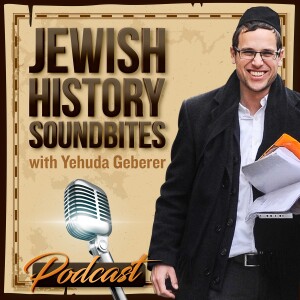
Saturday Dec 14, 2024
Witnesses at the Eichmann Trial
Saturday Dec 14, 2024
Saturday Dec 14, 2024
The prosecutor at the Eichmann trial, Gideon Hausner, opened the trial with a speech to history. Evoking the memory of the Holocaust victims, and referring to them as the true accusers of Adolf Eichmann at the trial. With that speech both the dramatic atmosphere as well as the overall theme, were set for the entire ensuing trial. The over 100 witnesses took the stand not only to implicate Eichmann for his role in the Final Solution, but also to tell the world, the Jewish People and Israeli society what the Holocaust was all about. Through the often dramatic moments of witness testimony over the course of the trial, the broad scope of the Holocaust narrative was finally confronted. A clear before and after the trial was delineated in the collective memory of the Jewish People and the world at large regarding the history and memory of the Holocaust.
Cross River, a leading financial institution committed to supporting its communities, is proud to sponsor Jewish History Soundbites. As a trusted partner for individuals and businesses, Cross River understands the importance of preserving and celebrating our heritage. By sponsoring this podcast, they demonstrate their unwavering dedication to enriching the lives of the communities in which they serve. Visit Cross River at https://www.crossriver.com/
Subscribe to Jewish History Soundbites Podcast on: PodBean: https://jsoundbites.podbean.com/ or your favorite podcast platform
Follow us on LinkedIn, Twitter or Instagram at @Jsoundbites
For sponsorship opportunities about your favorite topics of Jewish history or feedback contact Yehuda at: yehuda@yehudageberer.com
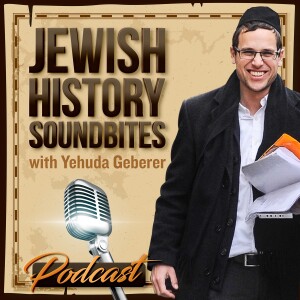
Saturday Dec 07, 2024
The Eichmann Trial
Saturday Dec 07, 2024
Saturday Dec 07, 2024
The trial for former SS officer Adolf Eichmann, one of the architects of the Final Solution, which took place in Jerusalem between April – August 1961, wasn’t merely a trial for one individual and his heinous crimes. The trial showcased the story of the Holocaust and broadcast it worldwide for the world, the Jewish People and the State of Israel to confront and make part of its consciousness. Examining various aspects of the Eichmann trial and its proceedings will present a narrative of exposing the story of the Holocaust as we know it today.
Check out a previous episode of Jewish History Soundbites which dealt with the Kapo trials during the 1950’s prior to the Eichmann trial: https://jsoundbites.podbean.com/e/collaboration-or-cooperation-eliezer-greunbaum-jewish-kapos/
Cross River, a leading financial institution committed to supporting its communities, is proud to sponsor Jewish History Soundbites. As a trusted partner for individuals and businesses, Cross River understands the importance of preserving and celebrating our heritage. By sponsoring this podcast, they demonstrate their unwavering dedication to enriching the lives of the communities in which they serve. Visit Cross River at https://www.crossriver.com/
Subscribe to Jewish History Soundbites Podcast on: PodBean: https://jsoundbites.podbean.com/ or your favorite podcast platform
Follow us on LinkedIn, Twitter or Instagram at @Jsoundbites
For sponsorship opportunities about your favorite topics of Jewish history or feedback contact Yehuda at: yehuda@yehudageberer.com
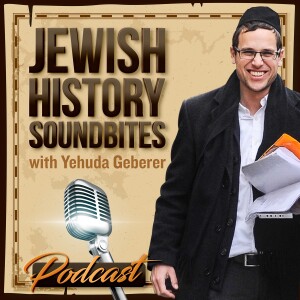
Saturday Nov 30, 2024
The Execution of Adolf Eichmann
Saturday Nov 30, 2024
Saturday Nov 30, 2024
With the recent passing of Shalom Nagar, the former prison guard who was the executioner of Adolf Eichmann in 1962, we examine the story of the events leading up to and including his execution. While the story of his capture by Mossad agents in Argentina is dramatic and well known, the story of his appeals and attempt at receiving a pardon, as well as the symbolic ending in his execution is an important part of the story and a closing chapter in Holocaust history.
Cross River, a leading financial institution committed to supporting its communities, is proud to sponsor Jewish History Soundbites. As a trusted partner for individuals and businesses, Cross River understands the importance of preserving and celebrating our heritage. By sponsoring this podcast, they demonstrate their unwavering dedication to enriching the lives of the communities in which they serve. Visit Cross River at https://www.crossriver.com/
Subscribe to Jewish History Soundbites Podcast on: PodBean: https://jsoundbites.podbean.com/ or your favorite podcast platform
Follow us on LinkedIn, Twitter or Instagram at @Jsoundbites
For sponsorship opportunities about your favorite topics of Jewish history or feedback contact Yehuda at: yehuda@yehudageberer.com
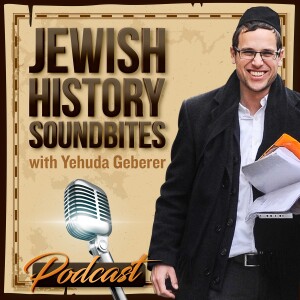
Saturday Nov 23, 2024
Saturday Nov 23, 2024
As the largest Jewish community in prewar Europe, Warsaw, Poland is a prime destination on many European Jewish history tours. One of the unique elements of a visit to Jewish Warsaw is a walk through its vast cemetery. Full of history, kivrei tzadikim and the rich tapestry of prewar Polish Jewry, it provides a singular perspective into a vanished world.
While the majority of tours focus on several highlights of the cemetery such as the first chief rabbi of Warsaw the Chemdas Shlomo, the mass grave of victims of the Warsaw Ghetto, the Netziv of Volozhin & Rav Chaim Brisker, the Modzhitz, Slonim & Radomsk Rebbes, etc., there is really so much more there than meets the eye. This episode will explore some of the less frequently visited personalities and memorials of the Warsaw cemetery, including other prominent Warsaw rabbis such as Rav Avraham Tzvi Perlmutter, many other Chassidic leaders such as the Biala, Vorka, Radzymin, Amshinov, Radzyn, Pilov, Sokolov and other rebbes, cultural and political aspects of prewar Warsaw such as the Yiddish writers, Yiddish theater, the Bund, Judenrat head Adam Czerniakow, and much much more. Get ready for an urban lively journey through a historic cemetery!
Cross River, a leading financial institution committed to supporting its communities, is proud to sponsor Jewish History Soundbites. As a trusted partner for individuals and businesses, Cross River understands the importance of preserving and celebrating our heritage. By sponsoring this podcast, they demonstrate their unwavering dedication to enriching the lives of the communities in which they serve. Visit Cross River at https://www.crossriver.com/
Subscribe to Jewish History Soundbites Podcast on: PodBean: https://jsoundbites.podbean.com/ or your favorite podcast platform
Follow us on LinkedIn, Twitter or Instagram at @Jsoundbites
For sponsorship opportunities about your favorite topics of Jewish history or feedback contact Yehuda at: yehuda@yehudageberer.com
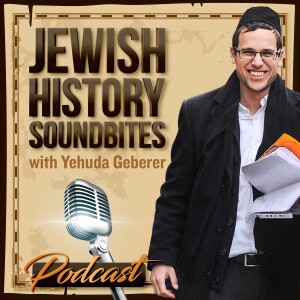
Saturday Nov 16, 2024
Meet the Metz: The Jews of Metz
Saturday Nov 16, 2024
Saturday Nov 16, 2024
Metz, France was host to one of the most prominent Jewish communities in the world at one point in history. An ancient Jewish community, it experienced a flourishing during medieval times before the Jews were expelled in 1365. Jewish settlement was again permitted in the mid-16th century and from 1648 following the Peace of Westphalia until the French Revolution in 1789, Metz experienced a golden age for its Jewish community. As one of the wealthiest Jewish communities in the world during this time, it attracted prestigious rabbinical talent with some of the greatest rabbis of the 18th century having served at its helm, including the Pnei Yehoshua, Rav Yonasan Eybuschitz, the Shaagas Aryeh and many others. It also funded a large yeshiva, and the town itself enjoyed demographic and economic growth. Following the French Revolution, the Metz community continued to thrive, but not as a center that it once was. Although much of the Metz Jewish community was decimated during the Holocaust, it was rebuilt and the Metz Jewish community continues to flourish until this very day.
Cross River, a leading financial institution committed to supporting its communities, is proud to sponsor Jewish History Soundbites. As a trusted partner for individuals and businesses, Cross River understands the importance of preserving and celebrating our heritage. By sponsoring this podcast, they demonstrate their unwavering dedication to enriching the lives of the communities in which they serve. Visit Cross River at https://www.crossriver.com/
Subscribe to Jewish History Soundbites Podcast on: PodBean: https://jsoundbites.podbean.com/ or your favorite podcast platform
Follow us on LinkedIn, Twitter or Instagram at @Jsoundbites
For sponsorship opportunities about your favorite topics of Jewish history or feedback contact Yehuda at: yehuda@yehudageberer.com
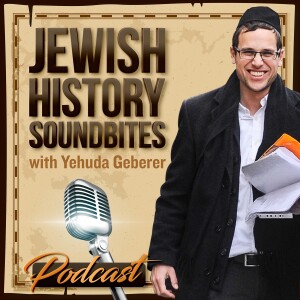
Saturday Nov 09, 2024
The Life & Times of Rav Yaakov Ettlinger the Aruch Lener
Saturday Nov 09, 2024
Saturday Nov 09, 2024
Germany Jewry of the 19th century was going through a period of transition. Emancipation was a struggle which was incrementally achieved, and rampant secularization and integration into German society followed. The rise of Orthodoxy was an attempt to preserve tradition within the modern context. Rav Yaakov Ettlinger (1798-1871) was a pioneering leader in this regard. Known by his magnum opus, Aruch Lener, he served as the rabbi of Altona for 35 years and was one of the most influential leaders of German Orthodoxy during the 19th century. His life, times and accomplishments are a fascinating and important chapter of Jewish history in modern times.
Cross River, a leading financial institution committed to supporting its communities, is proud to sponsor Jewish History Soundbites. As a trusted partner for individuals and businesses, Cross River understands the importance of preserving and celebrating our heritage. By sponsoring this podcast, they demonstrate their unwavering dedication to enriching the lives of the communities in which they serve. Visit Cross River at https://www.crossriver.com/
Subscribe to Jewish History Soundbites Podcast on: PodBean: https://jsoundbites.podbean.com/ or your favorite podcast platform
Follow us on LinkedIn, Twitter or Instagram at @Jsoundbites
For sponsorship opportunities about your favorite topics of Jewish history or feedback contact Yehuda at: yehuda@yehudageberer.com
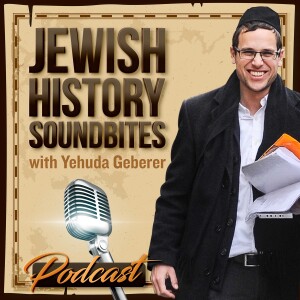
Saturday Nov 02, 2024
The Holocaust Research of Professor Yehuda Bauer
Saturday Nov 02, 2024
Saturday Nov 02, 2024
The field of Holocaust research has been enriched over the decades in both its scope and depth by generations of historians and researchers worldwide. For more than 60 years one of the premier scholars in this field was Professor Yehuda Bauer, whose groundbreaking research covering a wide array of aspects of the Holocaust, genocide and antisemitism transformed the field and had a decisive impact on Holocaust historiography. Among the many diverse topics which he contributed towards were Jewish resistance during the Holocaust, rescue activities of Jewish groups under Nazi occupation and American Jewish organizations such as the Joint Distribution Committee, the road to the Final Solution, the destruction of the shtetls during the Holocaust, Displaced Persons camps and immigration of survivors to Israel, the Holocaust within the context of genocide, trailblazing genocide research, Nazi ideology and its role in the Holocaust, Antisemitism throughout history, and many others.
Cross River, a leading financial institution committed to supporting its communities, is proud to sponsor Jewish History Soundbites. As a trusted partner for individuals and businesses, Cross River understands the importance of preserving and celebrating our heritage. By sponsoring this podcast, they demonstrate their unwavering dedication to enriching the lives of the communities in which they serve. Visit Cross River at https://www.crossriver.com/
Subscribe to Jewish History Soundbites Podcast on: PodBean: https://jsoundbites.podbean.com/ or your favorite podcast platform
Follow us on LinkedIn, Twitter or Instagram at @Jsoundbites
For sponsorship opportunities about your favorite topics of Jewish history or feedback contact Yehuda at: yehuda@yehudageberer.com
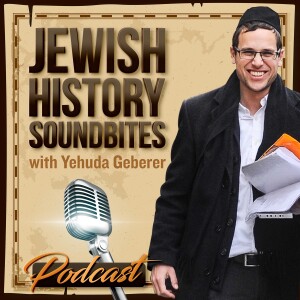
Saturday Oct 26, 2024
Remembering Tragedy on Happy Days
Saturday Oct 26, 2024
Saturday Oct 26, 2024
With the Jewish calendar full of happy holidays and joyous occasions, and Jewish history filled with tragic events, an inevitable paradox is confronted when wishing to commemorate a tragic occasion during a happy time. Unfortunately this was recently experienced with the desire to commemorate the first anniversary of the October 7th massacre on the holiday of Simchas Torah. There are quite a few examples throughout Jewish history of tragedy being commemorated on happy occasions, and the Jewish People have historically managed to strike a healthy balance between celebration and solemn remembrance. This episode will explore some of these historical paradoxes. From the First Crusade to a Krakow pogrom, and from the Soviet Union to the remembering the victims of the Holocaust, communal gatherings during the holidays were often utilized to remember the tragedies of the past.
Subscribe to Jewish History Soundbites Podcast on: PodBean: https://jsoundbites.podbean.com/ or your favorite podcast platform
Follow us on LinkedIn, Twitter or Instagram at @Jsoundbites
For sponsorship opportunities about your favorite topics of Jewish history or feedback contact Yehuda at: yehuda@yehudageberer.com
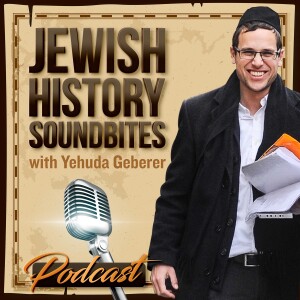
Monday Sep 09, 2024
Polish Patriotism & Rav Dov Ber Meizlish
Monday Sep 09, 2024
Monday Sep 09, 2024
Following the partitions of Poland at the end of the 18th century, there were several attempts of the Polish people to revolt against Czarist Russia or Austria during the 19th century. An interesting component of this story is the Polish patriotic position adopted by one of the most prominent Polish rabbis of the 19th century, Rav Dov Ber Meizlish (1798-1870). As a wealthy businessman and learned scholar, Rav Meizlish emerged as a public activist and leading spokesman on behalf of the Jewish community, successively serving in the rabbinate of the two largest and most prominent communities in all of Poland – Krakow & Warsaw. Following a contentious tenure at the helm of the Krakow rabbinate in which his leadership wasn’t accepted by the entire community, and where he served as a Jewish representative in the Austrian parliament, he was appointed chief rabbi of Warsaw in 1857. During the 1863 Polish revolt against Czarist Russia, he took a prominent and public position in support of Polish independence. Following his passing in 1870 he was remembered not only by the Jewish community, but across Poland as an ardent patriot.
Cross River, a leading financial institution committed to supporting its communities, is proud to sponsor Jewish History Soundbites. As a trusted partner for individuals and businesses, Cross River understands the importance of preserving and celebrating our heritage. By sponsoring this podcast, they demonstrate their unwavering dedication to enriching the lives of the communities in which they serve. Visit Cross River at https://www.crossriver.com/
Subscribe to Jewish History Soundbites Podcast on: PodBean: https://jsoundbites.podbean.com/ or your favorite podcast platform
Follow us on LinkedIn, Twitter or Instagram at @Jsoundbites
For sponsorship opportunities about your favorite topics of Jewish history or feedback contact Yehuda at: yehuda@yehudageberer.com
